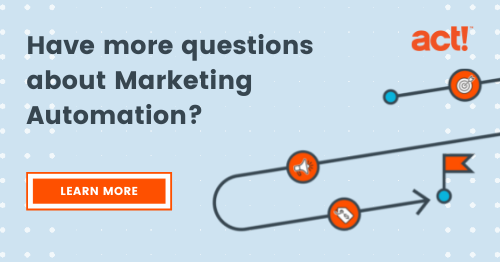
Professional services span a vast range of businesses, from legal, financial, and business consulting to creative designers and architects. Although all of these business models are completely different, they have one thing in common: They primarily sell services instead of physical products, and their businesses are based on building loyal, long-term relationships, not impersonal transactions.
Why are relationships so important?
Of course, every business must strive to earn a customer’s trust, but it’s even more important for professional services businesses, where customers place their confidence in something that is oftentimes intangible and future-focused. In addition, the services themselves can be complex, such as a long-term IT consulting project or investment planning with a financial services professional. As a result, building loyal, long-term customer relationships is increasingly important to gaining a competitive advantage and depends largely on your ability to establish trust and confidence over the entire course of your customer experience.
In the professional services industry, it can be extremely difficult to build customer relationships due to a number of factors. It all starts with how well you attract and nurture leads, convert them into customers, and meet (and hopefully exceed) their expectations. As a result, professional services companies are increasingly forced to find new ways to retain their customer base and attract new ones.
For instance, according to Gartner, 89% of professional services businesses will compete on customer experience in the foreseeable future. Another study by SuperOffice found similar results: 9 out of 10 businesses that prioritize the customer experience will eventually beat the competition to win the largest share of loyal customers due to increased customer satisfaction. As a result, the customer experience is now a top priority. It’s now considered the main factor driving the growth of the professional services market.

Are resource limitations hurting your business?
So what’s holding professional services companies back from attracting new customers, building deep relationships and delivering an exceptional experience? Some of the most common challenges include:
Hiring and onboarding inefficiencies
For many companies, finding and keeping the right skill sets can be difficult in a tight market. Plus, getting those people up to speed quickly is key to ensuring they can provide a seamless customer service experience. How can new employees get what they need to start working without relying on other employees?
Lack of sales and marketing expertise
Not every small business can afford to hire full-time sales and marketing experts. And, since business owners already wear multiple hats, it can be difficult to find adequate time to create and execute successful sales and marketing activities.
Too many time-consuming, repetitive tasks
Many companies still rely on manual data entry, such as customer contact updates and sales order entry. This can take valuable time away from focusing on customer needs.
Mismanaged customer data and insights
All too often, companies lack a centralized, integrated way to capture and manage customer data. This means that vital client information might reside in email and other apps, such as Outlook, Gmail, or spreadsheets. This lack of integration can make it impossible to track how well you’re meeting sales, marketing, and customer service targets.
Ongoing challenges with customer retention and upselling
Without the ability to manage all your data and metrics in one place, it can be hard to build upon existing customer relationships. To meet customers’ needs (and keep them happy and satisfied), it’s critical to know what they are asking for at any given moment so you can share the right services at the right time. If customer data resides in multiple, unintegrated platforms and apps, it can be almost impossible to anticipate future needs based on past purchases and interactions.
Overcome resource limitations and set your business apart
Although every step of the customer journey involves multiple actions and touchpoints, the good news is that much of this can be automated with a customer relationship management (CRM) platform. And when you combine CRM with marketing automation, you have an integrated, robust, and reliable tool that will save you time while providing a consistent and seamless customer experience. This can be a key differentiator for your professional services business as it leads to improved customer engagement, new business growth and the ongoing fostering of those much coveted, deep relationships.
What is CRM anyway?
Customer relationship management (CRM) software helps businesses manage all of their interactions with their existing and potential customers. With CRM, customer details and preferences are recorded and all customer activity and engagement is tracked. This enables you to provide a fully personalized and consistent experience to all of your clients, every time they engage with your business.
A CRM platform also helps businesses streamline their processes and workflows so that every part of the business is on the same page. Sales and marketing functions, especially, rely on CRM to create collaboration and improve their productivity.
The overall aim of a CRM platform is to provide more engaging customer experiences, increase customer loyalty and retention, and drive business growth and profitability.
Learn more about what a CRM is and how it can help your business.
What will marketing automation do for my business?
If you’re emailing newsletters, new product updates, announcements, and reminders to your prospects and customers, you’re already using email marketing. Marketing automation simply lets you streamline these activities by automating all of the tedious and repetitive tasks. You set up your communication touchpoints once and then your marketing automation software ensures they take place as scheduled. This automation increases the generation of new leads and improves your sales and marketing ROI — all while freeing you up to focus on other, more important tasks.
How Act! CRM and Marketing Automation will help you build deeper client relationships
Act! CRM provides an ideal platform for professional services companies of all types, such as financial advisors, brokers, consultants, lawyers, accountants, engineers, architects, creatives, and more. With Act! you can continuously build your pipeline of new leads, attract and convert prospects, and nurture existing customer relationships over the long term. As a result, you can achieve steady, predictable revenue through committed client relationships that also drive referral business and brand loyalty.
For example, consider a small financial services company whose clients have a broad range of investment needs. Some may be looking for aggressive growth portfolios, while others may want to buy a house or plan for a child’s education. The financial services business strategy includes offering a number of planning services at various price points but needs an easy way of messaging these services to all of their leads, prospects, and current customers. Act! is an ideal solution to accomplish all of these tasks without taking valuable time away from serving your target customers.
This is because, with Act!, you can build a complete view of your clients and prospects through a customizable CRM experience that tracks their key information. Act! ensures your sales and marketing efforts are always unified, which makes it easier to stay organized, manage your customer relationships, expand your sales pipeline, and meet strategic business goals.
And, because Act! is a full marketing and sales solution, it will help you easily take care of everything you need to manage your relationships and drive business by helping you to:
Stay on top of your data.
With Act!, all of your customer details are easy to access, whenever you need them. You can totally customize the dashboard to fit your workflow, and easily pull in customer contacts from integrated apps like Zoom and QuickBooks and email including Outlook and Gmail. This means your communications and calendar are always in sync without having to switch back and forth between apps and email. You can also use relationship and activity management features to automate communications and reminders so you never miss an opportunity to stay in touch with customers and prospects.
For instance, the small financial services company mentioned previously may have fewer than 10 people on the team, but they all need a way to access and update client information from a single source. Act! enables them to follow a consistent workflow to ensure that new client information is captured fully, accurately, and automatically thanks to integration with corporate email. Team members can also track every communication with clients and schedule calls or email follow-ups in a timely and consistent manner. Best of all, every associate can see these interactions and easily pick up where another team member left off before they went on vacation, for example.
Market and sell like a pro.
With Act! you don’t have to be a seasoned marketing professional to achieve great results. Act! provides all the tools you need to capture prospects and usher them effortlessly through the sales and conversion process. Tools such as email marketing provide professional and customizable templates to help your email campaigns stand out in a crowd, improve open rates, and generate results. Act! marketing tools are designed to help you go beyond the initial sale to drive repeat business and upselling. Plus, the opportunity and pipeline management features help you stay on top of leads and other sales opportunities to ensure nothing falls through the cracks.
For example, a financial services company can use Act! to capture leads generated from a web form. Based on the target demographic and offer (such as a retirement planning guide), the company can then create an email campaign to nurture these leads to download additional content with the goal of eventually setting up an initial meeting with a financial planner.
Work smarter, not harder.

Automation is the key to accomplishing more in less time. As your business grows, you need to shed time-consuming manual tasks so you can focus more on what really counts. Act! Marketing Automation (AMA) helps you eliminate tedious data entry and other management tasks that can consume valuable hours. Instead, AMA helps you create targeted marketing campaigns and other communications. Best of all, you can schedule emails in advance to ensure they go when and where they’ll make the most impact — whether it’s following up with prospects or offering relevant new services and promotions to existing customers.
For the financial services company, the ability to schedule and automate timely communications is critical. Sudden changes in the housing market, interest rates, or other market changes could trigger a series of emails to a specific prospect or customer demographic. For instance, an email might link to a report or prompt the recipient to schedule a meeting to discuss their financial planning goals in light of new market developments.
The result?
You’ll be able to capture, track and respond to the key engagement information you need to build and maintain deeper customer relationships and gain the competitive advantage you’re looking for to grow your business.








